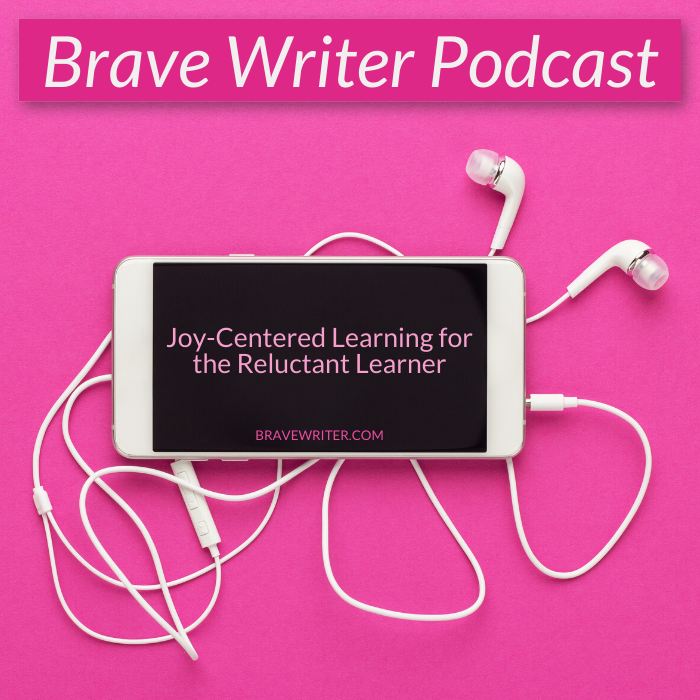
You can send a letter back in time to the you of a year ago. Knowing what you know now, what advice would you give to your younger self?
New to freewriting? Check out our online guide.

You can send a letter back in time to the you of a year ago. Knowing what you know now, what advice would you give to your younger self?
New to freewriting? Check out our online guide.
Tags: Writing prompts
Posted in Friday Freewrite | Comments Off on Friday Freewrite: Letter to Past You

A familiar refrain I am seeing everywhere in the Brave Writer space: that you feel overwhelmed by too much to do.
Let me make it perfectly clear here.
Don’t do everything!
Start with ONE of our products. Just that one. Read the information at the front or in the guidelines.
Then DO that thing without reading anything else, without planning anything else, without thinking about how it all fits together. That is utterly unnecessary.
You will get so much value if you deep dive into ONE of the products and take it just ONE week or project or activity at a time.
So do ONE thing this month and shelve everything else. If you find yourself really enjoying that thing, do it more! Don’t rush on to the next thing. Maximize the value right there. If you notice flagging interest after a bit, then turn your attention to the NEXT product and do ONE small bit of that one.
You cannot do this wrong!
Each product creates engagement with writing. ALL of them do. They all work.
You’re going to be okay. Take a risk and TRY one thing. Just one! See how it feels.
xo Julie

Posted in Brave Writer Philosophy, BW products, One Thing | Comments Off on Don’t Do Everything

This podcast episode addresses a specific question: What do I do about children who refuse to learn—children who:
How do we address this?
What we need to do is step back from insistence and coercion and rediscover the joy of learning—whether that comes through interest or directed school subjects. I will offer you a strategy for how to recapture some of that connection and joy in learning, even in relation to academic subjects.
Listen to the Podcast
Can Learning and Pleasure Co-Exist?
There’s a dichotomy that we’ve accepted that children are driven by pleasure alone and that, left to their own devices, would simply play with LEGO or watch their favorite YouTube channel all day. We don’t believe that there is inherent beauty or enjoyment to be had in multiplication tables, analyzing the grammar of a sentence, or writing about the Civil War. We see these as tasks that children have to be encouraged—or punished—into doing.
What this leads to is the idea that “real learning” occurs through requirement, and accidental-byproduct-learning happens through interests. Even if we say we value our child’s interests, we still see it as a secondary way of learning, a lesser way. Because it’s based in delight, the ethic that we’ve grown up with in the United States says that it’s not as valuable.
We know that there will come a time, maybe for college admissions, that they will need to prove that they know how to reduce a fraction—even if they can functionally do fractions while sewing or cooking—and we believe we will have failed as parents and teachers if we have not prepared them for that moment.
All Children Are Learning and We Can’t Stop Them
Whether playing a video game and calculating the risk factor of taking another hit and losing health, or deciding if they’ve measured their fabric correctly enough to make a cut, or changing up their written dialect when they’re texting a friend or their grandma, these are the decisions and critical thinking processes that are going on in our kids behind the scenes.
Learning is non-stop, it is largely invisible, and it is already tied to our school subjects—we just haven’t made the connection yet.
Seven Steps to Guide Your Child’s Education
1. Do nothing. Take a week where nothing is planned and let your kids do whatever is interesting to them. Spur that freedom by giving them even more opportunities to participate in their own lives.
2. Each night, reflect on what happened that day. Think of what your child actually did: from the big juicy conversation you had about their favorite movie series to the argument they had with their sibling and subsequent negotiations. Include everything they did and didn’t do. Assess how that child felt each day.
3. Tie the interest to a subject. Create a page with a box for each subject (reading, writing, math, science, history, grammar, personal interests & hobbies, miscellaneous). After you’ve listed the things your child has done, assign an item to each subject area. This will help you recognize how the things your kid has already done are adjacent to school subjects. Force the relationship if you have to.
4. At the end of the week, take those sheets and ask yourself: What’s missing? Are there any subjects that haven’t been naturally touched by their day-to-day activities? If you notice that something is missing, pause and think about how to address that one thing. You can support the development of what is already occurring by fanning those flames, but you really only need to focus on what’s missing.
5. Share with your kids. Show your sheets to your child and acknowledge how much they are doing meaningful activities. Your kids are using the tools they have to build their best life, and your job is to build on those tools to make their lives even happier instead of making them less happy in order to learn something we think they need to know.
6. Accommodate a child’s preference for when. Put this school subject into an hour of the child’s choosing when possible and try to create an environment that supports the child. Add a little coziness and warmth to the subject.
7. Only pick one lacking subject per month. When your child gets into a habit or routine, you can bring in another challenge the next month while continuing the previous one. Most of the time, refusal to learn comes from overload.
If you are trying to decide if this approach will work for you, keep in mind that you are ultimately in charge of your child’s education. During a year that feels abnormal, give yourself permission to experiment and see what would happen if you put your child’s joy at the center of their learning life. You may be surprised to see how much growth occurs.

Posted in Podcasts | Comments Off on Podcast: Joy-Centered Learning for the Reluctant Learner

for Brave Writer’s 2020 Online Writing Classes!
You’ve waited patiently: the wait is over!
Sign up now for Brave Writer Fall Online Writing Classes.
Our classes notoriously fill quickly, particularly those at the start of the semester. If you know what you want, be sure to sign up early to ensure that the class has room for you.
Take a moment to read about how to register to be sure you understand the process.
Please note that the class called The Writer’s Jungle Online is now called: Brave Writer 101: Guided Writing Process.
Look at all these classes!
I love how many we offer and the wide variety. We’ve got something for everyone. Please click through to the website for full descriptions, prices, and age ranges.
Contact us if you need help selecting a class.
Sign up for classes, get free membership in Brave Learner Home! Read the details about this special offer. (Membership begins once enrollment is paid in full.)
If you have any difficulties at all, please email [email protected] with your class selection, the name of your students (and ages), and a phone number to contact you.
Can’t wait to work with you and your kids!

Posted in Online Classes | Comments Off on Fall 2020 Class Registration is OPEN

Real Life Intrudes
“Cancer, pregnancy, foreclosure, hurricanes and fires, elderly parents, death, special needs, divorce, job transfers, military deployments… There’s no escape. The years when crisis hits, homeschool takes a back seat. (Don’t worry—it’s flexible enough to accommodate)” (The Brave Learner, 203). Trust that the challenge will ease and more energy can be redirected to homeschooling again.
What I’ve noticed is that parents who are in crisis sometimes become even more fixated on what feels like a failing homeschool. If you’re experiencing a lot of struggle in home education, turn around and do a quick inventory of the rest of your life.
What is draining your energy? This year, it’s COVID-19 whether you test positive or negative. We’re all dealing with this crisis and that impacts our ability to be as present to home education.
The good news? You can still keep it going. Reading aloud, playing board games, getting outside, talking about current events and how they relate to history, the science of a disease, math by worksheet if you must, using technology in new ways…
Hard times don’t mean the end of learning. Often they mean learning something new:
We don’t bring school home. Home education is bringing learning to all of life—trusting the process, trusting our families, trusting ourselves.
If you’re in an additional crisis to the global pandemic, sending extra support today.
This post is originally from Instagram and @juliebravewriter is my account there so come follow along for more conversations like this one!

Tags: Homeschool Sanity
Posted in Homeschool Advice | Comments Off on Homeschool Sanity: Principle Four

I’m a homeschooling alum -17 years, five kids. Now I run Brave Writer, the online writing and language arts program for families. More >>
IMPORTANT: Please read our Privacy Policy.















